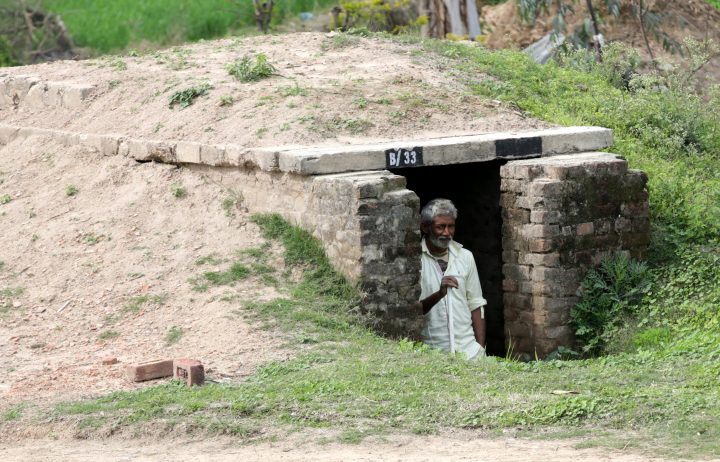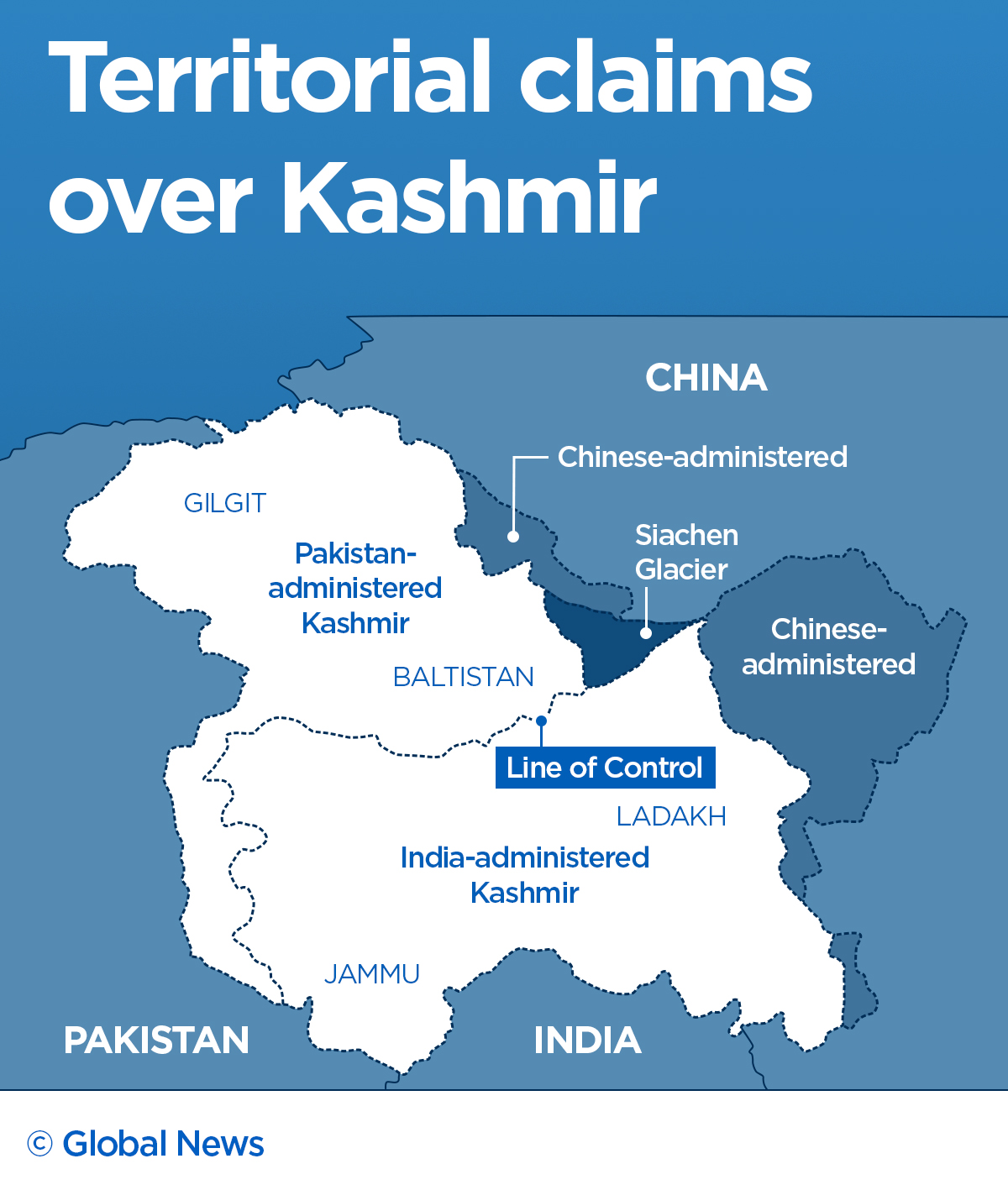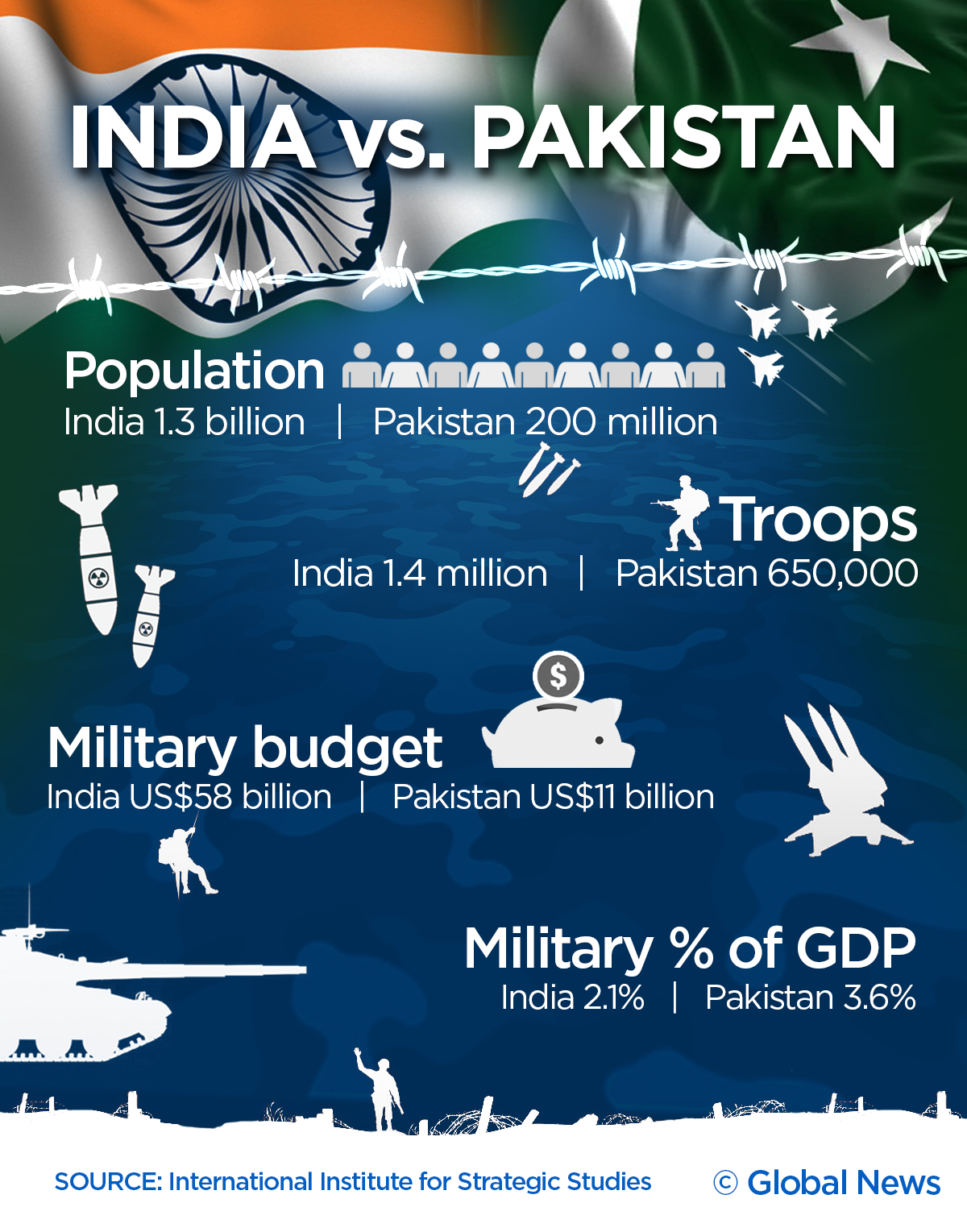War would be terrible for India and Pakistan, but for the people of disputed Kashmir, peace sounds like the same thing.

The boom of artillery shelling has picked up along the official Line of Control (LoC) that divides Kashmir this week, amid talk of war between the two nuclear-armed rivals. Indian and Pakistani warplanes occasionally roar by overhead, and troops from both sides are shooting at each other across the de facto border, sometimes in the middle of the night.
“People are afraid,” Shakir Ahmed, who lives in Poonch on the Indian-controlled side, told the Associated Press this week. “We pray it doesn’t escalate into war.”
Mohammad Shafiq, who lives on the Pakistani side in Chikhoti, says he built bunkers near his home years ago for just such an occasion. “We will use them if there is any attack from India in our area,” he told AP.
India and Pakistan have more to gain by threatening war than by actually waging it, experts say, despite the recent conflict in the disputed Kashmir region. The latest conflict goes back to Feb. 14, when a suicide bomber killed 40 paramilitary police in India-administered Jammu and Kashmir.
WATCH BELOW: Suicide bomber kills dozens in Kashmir

The attack was carried out by a member of Jaish-e-Mohammed, a Pakistan-based militant group whose goal is to free the region from Indian control. India blamed Pakistan for allowing the militants to flourish within its borders – an accusation that Pakistan denies.

WATCH ABOVE: India’s military said Thursday that its air force planes had intercepted Pakistani aircraft they allege were trying to target military installations.
Both sides claim Kashmir as their own, though they each govern only a piece of the territory. Pakistan and India have fought two wars over Kashmir since 1947, when British India was split into separate nations. Kashmir’s fate was not explicitly decided at that time, and the struggle for total control of it has been playing out ever since.
India responded to the Feb. 14 bombing with an airstrike near Balakot, approximately 40 kilometres inside Pakistani territory.
WATCH BELOW: Pakistan, India offer different version of Indian airstrike
The two sides have shot down one another’s aircraft and traded fire in Kashmir ever since, but they’re unlikely to engage in full-blown war, according to C. Christine Fair, a professor of political science at Georgetown University.
“They’re not going to war,” Fair, who specializes in South Asian issues, told Global News. She says the two sides are scoring political points with their posturing over the attack, but they need to be cautious about escalating the situation into a nuclear conflict. She says the two sides prefer a “violent peace,” but another terror attack could derail their efforts to de-escalate the situation.
Here’s why India and Pakistan have something to gain by pushing one another to the brink of war – and everything to lose by going over it.
The nuclear option
Both India and Pakistan are believed to possess more than 100 nuclear warheads. They’ve each tested atomic weapons and nuclear-capable missiles, demonstrating that they can launch attacks if necessary.
“I think the most important thing to take away about the nuclear capabilities … is that they both hold each other vulnerable, which means a nuclear conflict in South Asia would be devastating,” said Ankit Panda, an adjunct senior fellow at the Washington D.C.-based Federation of American Scientists.

Get daily National news
“They can hit each other’s key urban centres,” Panda told Reuters.
According to the Bulletin of Nuclear Scientists, a nuclear exchange between India and Pakistan “or even a strike on a larger city, would be devastating, and would reverberate throughout the world.” The Chicago-based organization charts the risk of global nuclear disaster with their “doomsday clock.”
They say it would take less than four minutes for a missile launched from Pakistan to hit India.
WATCH BELOW: Doomsday clock set to 2 minutes to midnight

Pakistani Prime Minister Imran Khan said he would meet with his nuclear advisers earlier this week, and has refused to rule out the possibility of striking first. However, he also warned India against escalating the conflict to that point.
India and Pakistan haven’t fought a full-scale war since 1971, but they did nearly go to war in a crisis that broke out in 1999. Both sides eventually pulled back from war, amid international fears that one or the other might use its nuclear arsenal.
Khan offered an olive branch on Friday by releasing an Indian pilot captured earlier the week. The PM referred to it as a “peace gesture,” and has called for India to work toward a resolution to the crisis.
WATCH BELOW: Pakistan hands over captured Indian pilot

Why a ‘jaw-breaking response’ is good for India’s PM
The tensions between India and Pakistan are good for Indian Prime Minister Narendra Modi‘s bid for re-election, according to Narendra Subramanian, a political science professor at McGill University.
“The ruling party is trying to take advantage of this, trying to use it for its election propaganda, because it was facing eroding support,” Subramanian told Global News.
With an election slated for May, Modi has promised a “jaw-breaking response” to the suicide bombing in Jammu and Kashmir.
WATCH BELOW: Modi says military will no longer be ‘helpless in wake of terror’

Modi leads the Bharatiya Janata Party (BJP), a Hindu nationalist party that lost a string of state elections late last year. Subramanian says Modi’s sabre-rattling against Pakistan is already reinvigorating enthusiasm for the BJP. Indians celebrated in the streets on Tuesday after news of the airstrikes broke, and Modi has been using those airstrikes to drum up enthusiasm at rallies all week.
“I can assure you that India is in safe hands,” Modi told supporters at a rally on Tuesday, with a mural of the Kashmir victims displayed behind him. “Modi! Modi!” the crowd chanted in response.
“I think this is going to boost the electoral prospects of the BJP because people are generally in a celebration mood, that the government has been able to teach a lesson to Pakistan,” Sanjay Kumar, director of the CSDS think-tank and a leading pollster, told Reuters earlier this week.
“They are able to present themselves as standing up for India,” Subramanian said. “They have an incentive to keep the problem simmering, but because both sides have nuclear weapons, it’s not to their advantage to push towards a full-scale war.”
WATCH BELOW: Pakistanis celebrate downing of Indian warplane

The Indian government has also reacted to the attacks by targeting anti-India activists in Jammu and Kashmir. It banned a separatist group called Jamaat-e-Islami Jammu and Kashmir late Thursday, after arresting its leaders under its anti-terrorism laws. The group has not been publicly linked to the Feb. 14 attack.
“The Indian government has used the suicide attack… to crack down on a wide range of groups that are critical of the Indian government in Kashmir,” Subramanian said.
However, he suggests the situation might backfire on the BJP if it starts to appear more hawkish than Pakistan, whose prime minister has taken a more conciliatory tone. India’s much-celebrated airstrike also appears to have done less damage than it initially claimed. The government said it killed 300 militants in the attack, but Pakistan and reports from Reuters suggest the bombs hit nothing but a few trees.
“That may prove counterproductive,” Subramanian said.
Pakistan, peace and a complicated history of terror
Pakistani PM Imran Khan has repeatedly offered to help India investigate the attack in Kashmir, and called for peace talks to end the crisis. However, Khan is always operating under the shadow of the army, which has a history of acting on its own and occasionally overthrowing prime ministers, Fair says.
Fair says the crisis in Kashmir has helped the Pakistani army by stirring up domestic support for its actions. “The (Pakistani) army needs a very scary enemy to the east to help bring together Pakistanis domestically,” she said.
WATCH BELOW: Pakistan’s Imran Khan calls for peace talks with India

Pakistan’s powerful armed forces and intelligence agency frequently guide these militants toward their preferred targets, according to Subramanian. He says the civilian government might not have known about the Feb. 14 attack in Kashmir, but other branches of Pakistan’s leadership might have had advance knowledge.
“There are different actors that are somewhat independent of each other: the civilian government, the armed forces, the intelligence services and the Islamist militants,” he said. “These four groups sometimes push together, but not always.”
WATCH BELOW: Pakistan claims it shot down Indian jets

Subramanian says the Pakistani military might favour an attack that helps Modi get re-elected, because he represents an obvious anti-Muslim foe. “Then they will have somebody in power next door who it will be easy to paint as unreasonable,” he said.
Fair says Pakistan “cultivates” certain militant groups in order to damage its enemies without getting directly involved. “They are assets that the Pakistan army uses deliberately to prosecute its interests,” she said.
“(Pakistan) has an army that can start wars but can’t win them, and it has nuclear weapons that it can’t actually use… The only thing that it has at its disposal is using terrorism.”
U.S. intelligence chiefs described Pakistan as a “safe haven” for militant groups earlier this year, in their annual world threat assessment report to the Senate. They said Pakistan often uses militants as policy tools, and only confronts them when they are a direct threat to Pakistan.
Pakistan has denied any involvement in the Kashmir attack, but the country has a long history of allowing terror groups like Jaish-e-Mohammed to operate within its borders. Infamous 9/11 plotter Osama bin Laden was living in Pakistan when he was killed by U.S. troops in 2011.
WATCH BELOW: How Osama bin Laden hid in plain sight for years
Indian officials cited bin Laden’s death this week to justify their own strike inside Pakistani territory. “I remember when U.S. Navy Seals went to Abbottabad to kill Osama bin Laden,” Indian’s finance minister, Arun Jaitley, said Wednesday. “Why can’t India?”
India did launch a similar strike against militants inside Pakistan in 2016.
WATCH BELOW: India announces ‘surgical strike’ against Pakistan-based targets in 2016

Both Fair and Subramanian agree that even if India and Pakistan agree to de-escalate the situation, there’s always a chance that a rogue militant attack might push them into a war neither side wants.
“History tells us that wars are full of miscalculation,” Khan said in a televised statement from Pakistan on Wednesday. “My question is that given the weapons we have, can we afford miscalculation?”













Comments
Want to discuss? Please read our Commenting Policy first.